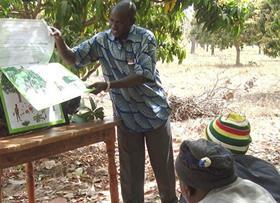
Through the Fit For Market (FFM) programme, officially launched in December 2016, interprofessional organisation Coleacp is supporting companies in the Africa, Caribbean and Pacific countries producing and exporting fresh and processed fruit and vegetables.
The organisation works in partnership with civil society and professionals in the public and private sectors, with the aim of developing and improving market access, training and sustaining their human resources, implementing an environmental management policy, improving their competitiveness and facilitating access to finance companies.
FFM was designed for a period of five years, based on the experiences and positive results of the PIP and EDES programmes, in line with industry requirements regarding sustainability.
The project is managed by Coleacp and is part of the intra‐ACP indicative programme (2014‐2020) for cooperation between the EU and ACP states. The total budget is €25m, with co-funding from the European Development Fund and AFD (Agence Française de Développement).
“In just six months, the programme has received 215 requests for support from 30 ACP countries,” says Coleacp’s head of information and communication, Emmanuel Bourcelet. “Following these numerous requests, the Coleacp team dedicated to FFM is mobilised to prepare actions in the field.”
Although potential has been identified on the European market, this is not to the exclusion of non-EU countries, according to Bourcelet.
“We observe a number of opportunities for development on the European market,” he says. “This does not mean, on the contrary, that the potential for commercial development outside the EU and the intra-regional ACP markets should be underestimated. As the FFM programme also explores these markets, more precise measurement of their potential for ACP fruit and vegetables will be the subject of further studies, planned in 2018.”
In April 2017, Coleacp conducted a market study into the opportunities for ACP producers to develop on the European market. After years of steady decline in consumption, the report noted a rise in demand in Europe for products that are healthy, practical and environmentally friendly.
“Over a 10-year period, we have seen a steady increase in ACP fruit and vegetable exports to the EU market,” says Bourcelet. “Looking more closely at ACP products, there is a notable decline in pineapple exports, while exports of avocados, mangoes and vegetables have been growing steadily.”
December 2016 saw the introduction of the new EU Plant Health Regulation, which involves a major overhaul of EU plant health legislation that has been in place since 1977. It repeals and replaces the seven existing Council Directives on harmful organisms, becoming fully applicable on 13 December 2019.
According to Bourcelet, Coleacp will be working closely with ACP representatives at the SPS Committee, competent authorities in ACP countries and industry representatives to avoid any losses or breaks in trade that would have a negative effect on development.



